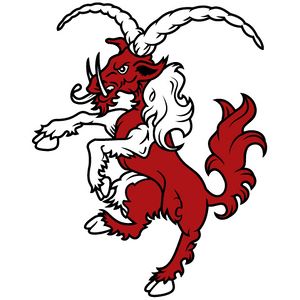Rampant: Difference between revisions
From Cunnan
Jump to navigationJump to search
(links) |
|||
| Line 3: | Line 3: | ||
In [[heraldry]], the [[posture]] of an [[animal]] rearing up, as if fighting, is described as being '''rampant'''. A winged animal in the same posture is called [[segreant]], while two rampant animals facing each other are [[blazon]]ed [[combattant]]. Rampant is traditionally used in reference to predators such as [[lion]]s, but in the [[SCA]] many [[animals (Heraldry)|animals]] have been registered with that posture. |
In [[heraldry]], the [[posture]] of an [[animal]] rearing up, as if fighting, is described as being '''rampant'''. A winged animal in the same posture is called [[segreant]], while two rampant animals facing each other are [[blazon]]ed [[combattant]]. Rampant is traditionally used in reference to predators such as [[lion]]s, but in the [[SCA]] many [[animals (Heraldry)|animals]] have been registered with that posture. |
||
[[Category:Device heraldry]] |
[[Category:Device heraldry]][[category:heraldic poses]] |
||
Latest revision as of 04:14, 8 September 2005

A Yale Rampant
In heraldry, the posture of an animal rearing up, as if fighting, is described as being rampant. A winged animal in the same posture is called segreant, while two rampant animals facing each other are blazoned combattant. Rampant is traditionally used in reference to predators such as lions, but in the SCA many animals have been registered with that posture.